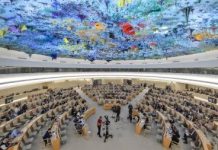ISLAMABAD, SEPT 8 (DNA) – Several studies have shown that Pakistan’s air is not safe for human health and causes thousands of premature deaths annually.
Ironically, we don’t have ample facilities to measure air quality all over the county and control vehicular and industrial pollution. On the other hand, we have coal plants for energy and cement production adding more pollutants to the air.
Well-known environmentalist and Executive Director Development Communications Network (Devcom-Pakistan) Munir Ahmed remarked while speaking to a webinar as chief guest, organized by the IDCLC, on Tuesday to mark the first ever International Day of Clean Air for Blue Skies.
Encouraged by the increasing interest of the international community in clean air, and emphasizing the need to make further efforts to improve air quality, including reducing air pollution, to protect human health, the General Assembly decided to designate 7 September as the International Day of Clean Air for blue.
The United Nations Environment Programme (UNEP) is responsible for facilitating the observance of this Day, recognizing the need for increased awareness and international cooperation to reduce air pollution.
Ahmed said: Air pollution is the single greatest environmental risk to human health, causing 7 million premature deaths annually from diseases like stroke, heart disease, chronic obstructive pulmonary disease, lung cancer and acute respiratory infections.
It is responsible for a substantial amount of disability for those living with these diseases. Many air pollutants are also powerful climate forcers, harming the health and well-being of those living today and making the world less safe for future generations.
He said despite citizens’ concerns over the increasing air pollutants causing glaciers melt and pacing up the climate impact, governments worldwide behaving irrationally to control air pollution. Sufficient investments are not made in this regard by the developed world that is responsible for the compromised air quality.
Munir Ahmed said we immediately need to work on the air quality of Karachi, Lahore, Multan, Peshawar, Faisalabad, Muridke, Bahawalpur, Gujranwala, Islamabad, and Rawalpindi. This is ironic to note that Islamabad is 7th most polluted city in Pakistan despite all tall claims of a clean and green city.
IDCLC founding president Shaaref Munir said air comprises certain elements that need to stay in their respective proportions. Any changes in it would lead to pollution or making the air harmful to breathe in.
Clean air is primarily a source of sustaining growth and life. By breathing cleaner air, one can reduce the risk of getting a stroke, any heart disease, lung cancer and/or respiratory diseases such as asthma.
In the opposite scenario, living in a polluted area would lead to catastrophic short and long-term effects on human health – especially to their respiratory tract.
Children and infants’ health is most likely to be affected by their surrounding air quality, compared with the other age groups, and may grow up with a number of breathing problems if they’re brought up in a polluted environment.
Therefore, maintaining air quality is a must for sustaining good human health and the surrounding environment to live in – especially for a country like Pakistan where 35-40 percent of its population comprises children under the age of 15.
Sadaf Yasin said the air we breathe knows no borders and envelopes and sustains all living things. Yet our relationship with this most basic life-giving substance has changed. Nine out of 10 people around the world breathe air that does not meet World Health Organization guidelines for clean air. We have the solutions and must take the necessary actions to improve air quality.
President IDCLC Haares said that his club members have planted more than 10,000 plants in different parts of the city to contribute their role in improving the air quality and environment.
He said it is our responsibility to maintain quality air because every living thing on earth is dependent on quality clean air.
From humans to wildlife to trees, one of the most important factors for their survival is clean air. All living things on Earth are interlinked. Bad air quality can lead to air pollution, which could further result in human and wildlife diseases. Air quality is a must to immensely reduce the negative effects it could have on living and nonliving creatures on earth. DNA
==================











